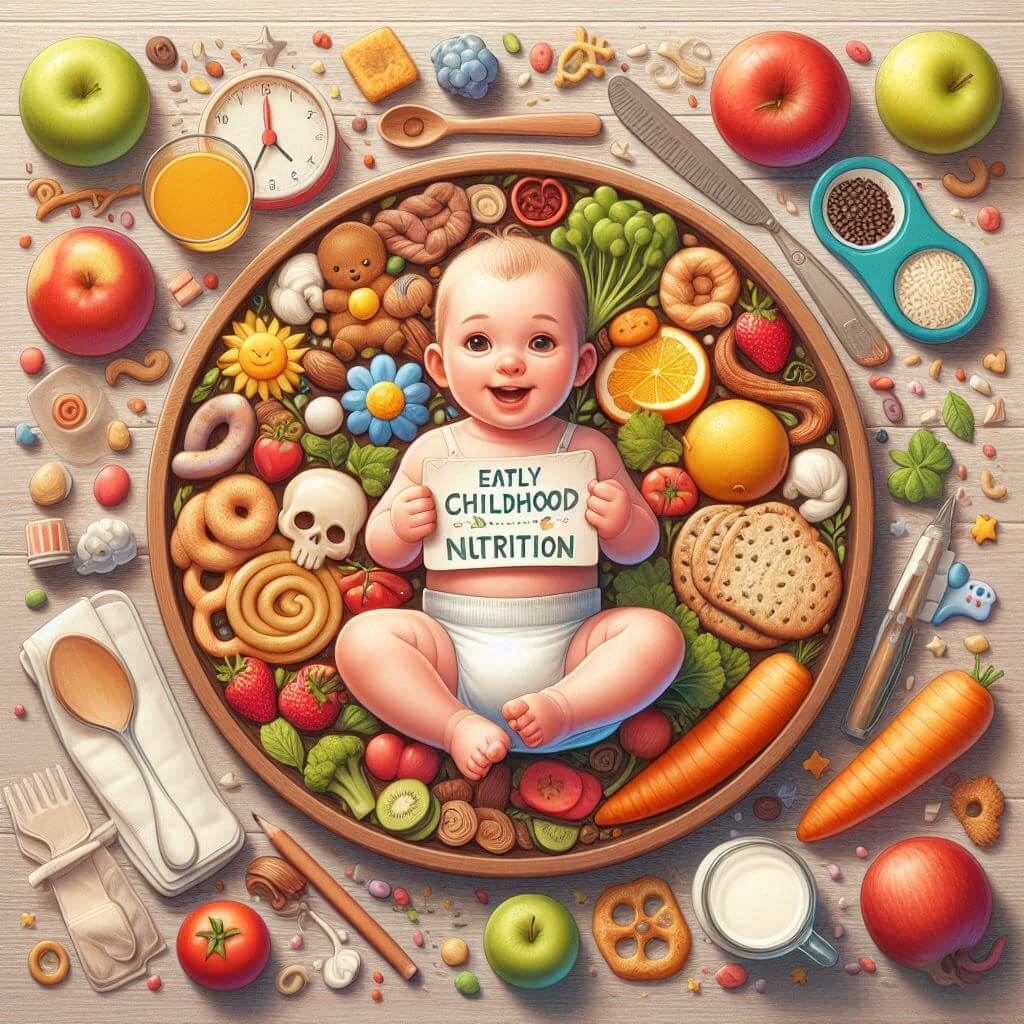Early childhood, which extends from birth to age five, is a magical and crucial period in human development.
This is when the child's brain, bones and organs grow and develop at an accelerated rate, laying the foundation for a healthy and fulfilling life.
In this scenario, nutrition stands out as a fundamental pillar, providing essential nutrients for this extraordinary process.
A Symphony of Nutrients for Growth and Development:
Just as a conductor conducts an orchestra, a balanced diet in early childhood orchestrates the child’s overall development. Each food group contributes a unique melody to this symphony: Ministry of Health of Brazil:
- Proteins: the high notes that build and repair muscles, allowing the child to explore the world with strength and vitality. Lean meat, chicken, fish, eggs, legumes and nuts make up this essential melody.
- Vitamins and minerals: the vibrant notes that ensure the proper functioning of the body, from night vision (vitamin A) to the formation of strong bones (calcium). Citrus fruits, broccoli, milk and yogurt are some of the instruments in this nutritional symphony.
- Complex carbohydrates: the energy base that provides the energy needed for tireless play and discovery of the world. Whole grains such as brown rice, oats and wholemeal bread ensure this sustained melody.
- Healthy fats: the gentle notes that nourish the developing brain and protect the heart. Avocado, olive oil, nuts and seeds make up this essential melody for cognitive development.
- Hydration: the regency that ensures the proper functioning of the entire body. Water, pure and crystal clear, is essential to keep the child hydrated and active.

The Consequences of an Out-of-Tune Melody:
Just as an out-of-tune song can cause discomfort, an unbalanced diet in early childhood can lead to several short- and long-term health problems, such as:
- Nutritional deficiencies: missing grades that can affect cognitive development, immunity and bone health, impacting the child's potential.
- Obesity: a dissonant melody that increases the risk of chronic diseases such as diabetes, heart disease and some types of cancer, which can compromise quality of life in the future.
- Harmful eating habits: an uneven rhythm that, if learned in childhood, can persist into adulthood, perpetuating the cycle of health problems.
Driving the Melody of Nutrition:
To ensure a nourishing symphony in early childhood, some strategies can be used as powerful instruments:
- Food education: teaching children about the different food groups and their benefits, showing how each food contributes to a healthy life, is like passing on musical knowledge to new generations.
- Parental involvement: Parents are the conductors of this orchestra, and it is essential that they serve as positive role models and get involved in preparing meals and choosing healthy foods, guiding children in the right direction.
- Variety and colors: Offering a variety of colorful foods, each representing different nutrients, is like creating a rich and vibrant score, sparking children's interest and expanding their food horizons.
- Family meals: Moments around the table, sharing nutritious meals, are like family concerts, strengthening bonds and creating emotional memories that contribute to a positive relationship with food.
- Nutritious snacks: Having healthy snack options at home, such as fruits, cut vegetables, yogurt and cheese, is like having instruments always in tune at your disposal, ensuring that the nutritious melody remains constant throughout the day.
- Nutritious and healthy recipes

Overcoming Symphony Challenges
Just as a musician faces technical challenges, some difficulties can arise in the journey of early childhood nutrition:
- Preference for processed foods: The attraction to intense flavors and convenience can lead to overconsumption of processed foods. Introducing healthy alternatives with similar flavors and gradually introducing new foods is like fine-tuning instruments, seeking a balance between taste and nutrition.
- Lack of time: The rush of everyday life can make it difficult to prepare healthy meals. Planning meals in advance, cooking in large quantities and freezing portions are strategies that work like a well-organized score, optimizing time without compromising nutritional quality.
- Refusal of food: Some children may be resistant to new flavors and textures. Presenting foods in different ways, such as purees, soups or creative combinations, is like finding new interpretations of the same melody, making the eating experience more enjoyable.
- Influence of the environment: The availability of ultra-processed foods and advertising aimed at children can create challenges. Creating a healthy eating environment at home, with nutritious options always at hand, is like building a welcoming concert hall where the music of nutrition can be fully appreciated.
The Health Orchestra:
One food Balanced nutrition in early childhood is the basis for a healthy and fulfilling life. It is like an orchestra in harmony, where each instrument plays a fundamental role.
Parents, caregivers and health professionals are the conductors of this symphony, responsible for creating an environment favorable to the development of healthy eating habits.
By involving children in the process of choosing and preparing food, we are teaching them to appreciate the music of nutrition.

By offering a variety of flavors and textures, we are expanding the food repertoire. By creating a positive environment around food, we are cultivating a love for health music.
Investing in early childhood nutrition is sowing the seeds for a healthier future. It’s like planting a growing orchestra that will produce melodies of well-being for a lifetime.
Nutrition in early childhood is a symphony that deserves to be conducted with mastery.
By providing essential nutrients, creating healthy habits and overcoming challenges, we are building a solid foundation for children's full development.
It is a journey full of harmony, challenges and rewards, where each dietary note contributes to a healthier and happier life.
Do you want to address a specific topic related to early childhood nutrition?
Browse through the sections and find answers to your questions about early childhood nutrition:
1. Basic Nutrition for Babies:
| Question | Response |
|---|---|
| How important is breastfeeding for a baby? | Breastfeeding is the ideal food for babies in the first six months of life, providing all the essential nutrients for their growth and development. Breast milk contains proteins, fats, vitamins, minerals and antibodies that protect the baby from infections and diseases. In addition, breastfeeding promotes a unique emotional bond between mother and child. World Health Organization (WHO): |
| What should I do if my baby is not gaining weight properly? | If you are concerned about your baby’s weight gain, it is important to consult a pediatrician. Your pediatrician will be able to assess your baby’s growth and determine if there are any problems. Some common causes of slow weight gain include insufficient breastfeeding, gastroesophageal reflux problems, and food allergies. |
| When should I start introducing solid foods? | Most babies are ready to start solid foods between 4 and 6 months of age. Signs that your baby is ready for solid foods include: sitting up with support, having good head and neck control, showing interest in food, and having doubled their birth weight. |
| What are the recommended first foods for babies? | Your baby’s first solid foods should be smooth, lump-free pureed fruits and vegetables. Some good choices include mashed avocado, banana, apple, sweet potato, and broccoli. It’s important to offer your baby a variety of foods so he or she can experience different flavors and textures. |
| How to deal with food allergies in early childhood? | If you suspect your baby has a food allergy, it’s important to see an allergist. The allergist can perform tests to confirm the allergy and recommend a treatment plan. It’s important to avoid the allergenic food in your baby’s diet and be aware of the risks of allergic reactions. |
2. Child Nutrition for Growth:
| Question | Response |
|---|---|
| What are the main nutrients needed for child growth? | Children need a variety of nutrients to grow and develop properly. Some of the most important nutrients include proteins, fats, carbohydrates, vitamins, and minerals. Proteins are important for muscle growth, fats are important for brain development, carbohydrates provide energy, and vitamins and minerals are essential for many body functions. |
| How to balance a diet for growing children? | A balanced diet for children should include a variety of foods from all food groups. The Healthy Eating Plate is a useful tool to help plan healthy meals for children. It divides foods into five groups: fruits, vegetables, whole grains, proteins and dairy. |
| What are the recommended healthy snacks for children? | Healthy snacks for kids should be nutritious and filling. Some good snack options include fruits, vegetables, yogurt, cheese, nuts, and seeds. It’s important to avoid processed and high-sugar snacks. |
| How to deal with food selectivity in children? | Food selectivity is common in young children. It is important to be patient and not force your child to eat. Continue to offer a variety of healthy foods and let your child try new foods at his or her own pace. |
| How to prevent childhood obesity through diet? | Childhood obesity is a serious problem that can lead to long-term health problems. To prevent childhood obesity, it is important to provide your child with a healthy, balanced diet and encourage regular physical activity. |
3. Common Questions about Infant Nutrition:
| Question | Response |
|---|---|
| My son/daughter is very active, what should I feed him/her? | Active children need more energy than sedentary children. It is important to provide your child with a healthy, balanced diet that includes plenty of fruits, vegetables, whole grains, and protein. You can also provide healthy, nutritious snacks between meals. |
| How to deal with feeding difficulties during the transition phase to solid foods? | The transition to solid foods can be |









